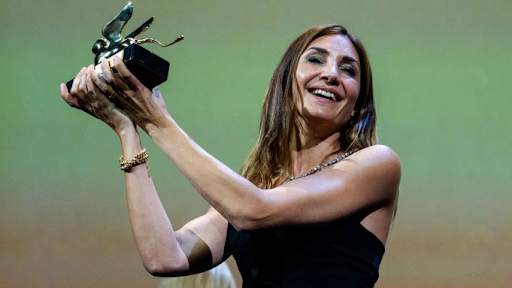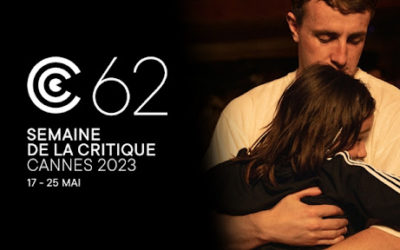Source: Deadline
Although many would consider the summer movie season to have concluded by now, that doesn’t mean it’s no longer a time for the art of cinema to flourish. Nowhere is this more evident than in the film festival scene, in which several major events are taking place around the world and showing off the best films they have to offer. There are many esteemed festivals to take note of, but the one that has most recently come and gone was one of the most significant events of the early film awards season, the Venice Film Festival. Taking place this year between September 1st and September 11th, the festival showcased a great number of feature-length and short films made by filmmakers from across the globe, some of which were even shown on the big screen for the very first time. Before its end though, the festival took the time to hand out a small number of awards for the films and filmmakers whose efforts festival judges deemed to be the best of this year’s cinematic output, the most prestigious being the Golden Lion, the festival’s award for best film. The competition was strong, but in the end, decisions were made, and the winners were announced.
Coming out on top was “L’Evénement (Happening)”, a French film based on a novel by Annie Ernaux, which is centered around a young woman living in 1963 who must contend with an unexpected pregnancy and whether or not she should have an abortion. Accepting the Golden Lion for the film was its director, French-Lebanese filmmaker Audrey Diwan, making her the sixth female director (and the second in the row, following last year’s winner Chloe Zhao for “Nomadland”) to receive the honor. In her acceptance speech, Diwan expressed her gratitude for the award and how much making the film meant to her. “I did this movie with anger,” Diwan states, “I did it with desire, also my heart and my head. I wanted “Happening” to be an experience, a journey in the skin of this young woman.”
Receiving the runner-up prize, the Silver Lion Grand Jury Prize, was “The Hand of God”, an autobiographical piece from director Paolo Sorrentino that focuses heavily on the filmmaker’s youth and the trauma he experienced from losing his parents at such a young age. The film, which will receive a limited theatrical release from distributor Netflix before its debut on streaming, also received the Marcello Mastroianni Award for Best New Young Actor and Actress, which went to the actor who plays Sorrentino in the film, Filippo Scotti (referred to by many as the “Italian Timothée Chalamet”). Sorrentino, who had previously won an Oscar for his 2013 film “The Great Beauty”, was equally emotional in the acceptance of his award, tearing up as he gave his speech in his native Italian tongue.
“The Hand of God” was not the only Netflix-distributed film to receive awards recognition from the Venice Film Festival though. “The Power of the Dog”, for example, allowed its director Jane Campion to take home the award for Best Director, while the prize for Best Screenplay was given to Maggie Gyllenhaal for the script she wrote for her feature directorial debut, “The Lost Daughter”. In her acceptance, Gyllenhaal enthusiastically expressed her admiration for the Italian nation and how thrilled she was to have her first film premiere at Venice. ”I can’t tell you how thrilled I am to be here,” she told those who were present to hear her speech. “I was married in Italy, in Puglia. I found out I was pregnant with my second daughter in Italy and really my life as a director and a writer and my film was born here in this theater.”
Then there are the acting categories, awarded as part of the Volpi Cup Prize. Earning the prize for Best Actor was Filipino actor John Arcilla for his performance in “On the Job: The Missing 8”, while Best Actress went to Penelope Cruz for her role in the Pedro Almodóvar-directed drama “Parallel Mothers” (pulling something of an upset for those who had anticipated a victory for “Spencer” leading actress Kristen Stewart). Although much of her acceptance speech was dedicated to her family as a whole (including husband Javier Bardem and their children), Cruz gave special acknowledgement to her recently deceased mother-in-law Pilar Bardem. “At the end of our last conversation she told me, ‘I love you.’,” Cruz claims in her speech. “She was very fragile and I thought those were her last words to me, but then very quiet and very soft and with a smile on her face she said to me two more words ‘Coppa Volpi’… This is for all the mothers.”
The festival’s main competition drew most of the attention and showcased some of the more noteworthy works of cinema the event had to offer, but that didn’t mean the Horizons program didn’t have its fair share of exceptional films. “Pilgrims”, for example, was named Best Film (with director Laurynas Bareisa accepting the honor), while “A Plein Temps” received awards for both Best Director (Eric Gravel) and Best Actress (Laure Calamy). The Special Jury Prize, meanwhile, went to “El Gran Movimento” and its director Kiro Russo, Piseth Chhun won Best Actor for his performance in “White Building”, and the script for “107 Mothers”, from writers Ivan Ostrochovský and Peter Kerekes, was named Best Screenplay. Also receiving prizes from the Horizons program were “Los Huesos” (directed by Cristóbal León and Joaquín Cociña) for Best Short Film, and “Imalculat” (directed by Monica Stan and George Chiper Lillemark) for the Lion of the Future, the Luigi De Laurentiis Award For A Debut Film.
With so many wonderful films screened and awarded throughout the eleven-day event, it’s safe to say that the Venice Film Festival was once again a major success. Although not without its hiccups here and there (specifically those relating to delays caused by glitching ticket reservation and longer-than-anticipated security lines), such missteps were not enough to prevent the festival from taking place and exhibiting the best that cinema has to offer. With there still being many more major film festivals to come, there’s hardly any reason why the rest of the festival circuit shouldn’t be pulled off to similar success.




